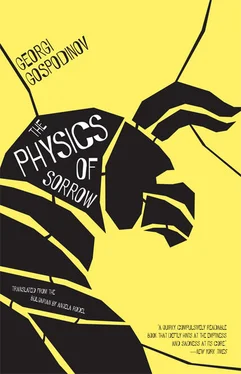2.
It was rape, I’ll tell you flat out, rape, pure and simple, without physical communion, I know that bit about physical communion from the late Judge R., may he rest in peace, he spent more nights with me than with his lawfully wedded wife, we had physical communion, that’s what he called it, I didn’t mind, it was the same thing, it just sounded fancier, so unlike the late judge, Mr. G. and I didn’t engage in any physical communion, yet despite that I’ve never been so roughly and brutally raped, I had to suffer all his crackpot ranting about infidelity and sin, the likes of which I hadn’t even heard from my husband. you call a woman over to your house, strip her naked and then look her over as if inspecting sheep, you condemn her, as if you yourself weren’t the one leading her into sin, and in the end you throw her out. I’ve never felt so bruised and degraded after any other man, I got up, went straight over to Judge R. and told him that Mr. G. had tried to rape me and lead me into. I fixed him good, I don’t know what exactly my dear judge did or how he did it, but the very next day, in the darkness before dawn, Mr. G. slunk out of town, and no one ever mentioned him again, probably because in every house there was someone who had passed through his iron bed. all these years and you, sir, are the first to ask about him, why do you want to know. had we spoken of money, thank you, thank you.
3.
That’s exactly how he was, the Venerable G., sir, if you want an honest answer, incidentally I don’t know if he had an ecclesiastical title, he had devoted himself to tempting women, but not all women, only wives, only faithful, obedient wives. and when they ended up in his bed sooner or later, he would not lay on a finger on them, he would start asking them why they were there, what they expected of him, what had prompted them to abandon their husbands and children, he talked about morality, oh yes, he was big on morality, he was; the woman would be lying undressed in his iron bed, and he would wag his finger in her face, talking, looking her over, asking. I’ve already reached the age when I have nothing to hide, so I’ll admit it, I was there, too, never judge wives too harshly, sir, we are wretched creatures, they force you into bed and you start giving birth every year and a half, as if racing against the cow in the barn and the pig in the pen, while Mr. G. was not like the local men and he wasn’t a local, he didn’t stink like onion, he didn’t swear at animals and children, he didn’t spit on the floor, and he read books. all the wives were crazy about him, I swear, so he didn’t really need to do much at all to land them in his bed, with all the risk that entailed back then. When it was my turn to lie in that cold room, I meekly listened to all he had to say, because sin really was circling over the bed, but when he was done I asked him straight out why he did this, wasn’t it equally unnatural and sinful not to lie with a woman whom you had called over, who had come to you, and who had stripped herself bare of everything, her husband, her children, all of Divine Law. he was amazed that I had the courage to ask him anything at all in my state, then replied that he was a natural scientist studying sin and infidelity, he wanted to isolate it in its purest form, to distill it, and when he saw that I didn’t understand much of his scholarly fiddle-faddle, he said — and I quote: You, woman, are the olive from which I press sin like olive oil.
More than forty years have passed, but to this day those words give me chills, sir. his eyes when he said that looked like two dark-green olives, and again I tell you that I cannot judge him, the Venerable Mr. G., something terrible must have happened to him to make him do such things. he was an abandoned soul. never go into an abandoned house or visit an abandoned person, there are only owls and snakes there — that’s exactly how he was, if you’re looking for an honest answer.
Oh no, I no longer need money. But what exactly is he to you, sir?
.
What exactly is Mr. G. to me? And what am I doing way back here in the year 1734? I’m buying stories under the guise of olive trading. What makes me better than Mr. G.? And aren’t we talking about one and the same olive oil?
An old woman told me a story that her grandmother had heard from her grandmother about some guy who had possessed all the married women in these parts. That in and of itself wouldn’t have grabbed my attention if it hadn’t been for the name she uttered — a name that has been dogging me for some time now.
Gaustine. The person who would easily cross over eras like a shallow river and would always find a way to send me a sign from one time or another. I will never really be sure whether he existed for real or whether I’ve thought him up, or whether I myself was thought up by him. His latest move, I must admit, has surpassed all of my expectations. For several years now a book under my name (in German translation) that I never wrote has been circulating around the web: Ding, Kunst, Kant und Zeitgenossen (Wieser Verlag, 2005). You can look it up.
I’m waiting for his next book, under the name Gaustine, in which the main character will have my name.
I once Googled him. Immediately some Angelina Gaustine came up, who is known to have died exactly in the year 1900 at the age of 70 and who is buried in the cemetery in Paoli, Indiana. The source was the diocese’s death records.
In one family tree, a certain Lucinda Gaustine, born 1853, also turns up. In another place, there’s Molly Gaustine with a question mark after the name. Somewhere in Oregon we find one B. Gaustine. But everywhere the name exists only as a surname and never as a first, given name. Only his children were recorded in these books. A common, disappeared father.
After returning from this story (it was a rough journey, I had to transfer from voice to voice, it was a third-generation story, and after all, it’s becoming ever harder for me to reach my erstwhile empathy), I dug into the archives around the place of the story, made various inquiries and indeed found confirmation. In one “Common Book of Births, Burials, Weddings, Debts, and Other Unusual Events,” the name Gaustine came up. The very same person had arrived in the town precisely in 1700 and three years later was written off “without the right to return to the city.” With three strange little crosses in the book’s margin, which in those parts marked encounters with the Evil One.
THE UNDERGROUND ANGEL
The story of the guy born with angel’s wings. The night before his birth, a messenger appeared in a dream and told his mother, okay, so this is the deal, woman, your boy is a gift from God, he will be an angel in human flesh. And as the rumor in town had it, the boy with the angel’s wings would possess incredible strength. “Strength” here was taken literally — lifting weights, beating everybody at wrestling, going head-to-head with a bear or slinging two bags of flour over your shoulder. Or lifting up a full cask of wine with your teeth at town fairs like the famous Harry Stoev. The only condition was that the mother not tell anyone.
Now I’m imagining that boy like a classical angel, so different from everything around him, like the seed of an Italian pine or some other plant not found in these parts, blown in on a Mediterranean breeze. A gangly, skinny — here they’d say “wimpy”—boy who would be the target of taunts. His mom wasn’t supposed to say anything, but she got scared that her son would be different, so she started blabbering about it left and right and his wings disappeared.
As kids we would secretly wait to catch a glimpse of him. He was a miner. Always somber and dirty. I would imagine him with big, limp angel’s wings dragging along behind him, black from the coal dust. He walked slightly hunched over and never took off his shirt. Perhaps the wings had kept growing under it? And he had to clip them every morning. Just like he had to shave. Or like how my grandma would clip the chickens’ wings so they wouldn’t flit over the fence, so they wouldn’t leave the yard. He wouldn’t leave it, either. His mother had chosen the son over the angel.
Читать дальше












